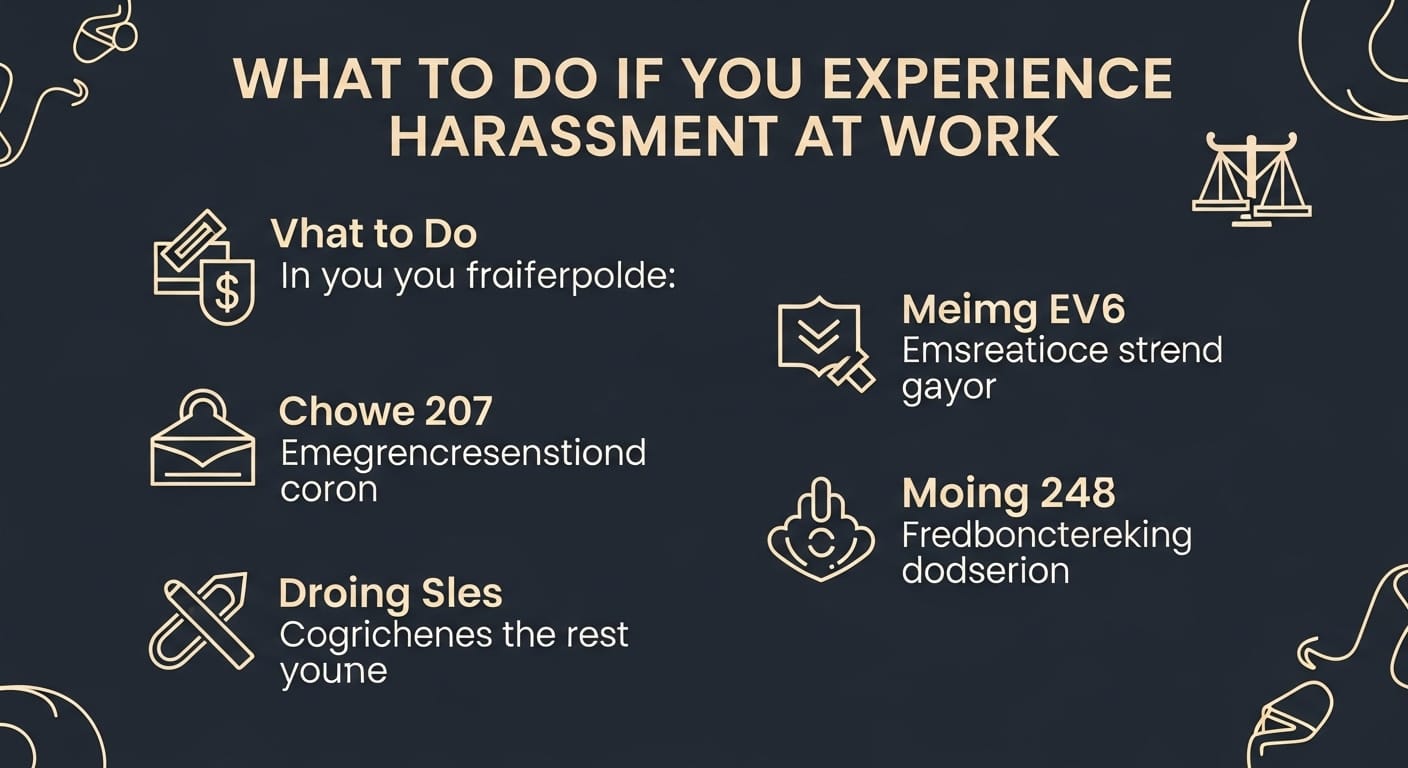Workplaces are supposed to be places where you do your job, collect your paycheck, and occasionally dodge awkward small talk with the coworker who insists on discussing their 16 cats. Unfortunately, sometimes they become the setting for something much more sinister—harassment.
If you’re dealing with harassment at work, whether it’s from a colleague, manager, or someone else, it can be incredibly uncomfortable, draining, and downright infuriating. But the good news is, you don’t have to just sit there and take it.

Top Takeaways and Key Concepts
Recognize Harassment: Identify verbal, physical, or subtle actions creating a hostile work environment.
Document Every Incident: Record dates, times, involved parties, and details of all harassment occurrences.
Report Promptly: Notify HR, supervisors, or appropriate company channels to formally address the issue.
Seek Legal Advice if Needed: Consult an employment lawyer if harassment persists or the company ignores complaints.
Know Your Rights and Protections: Understand federal and state laws protecting against harassment and retaliation.
Summary of This Article
The article explains how to handle workplace harassment by first recognizing what constitutes illegal behavior, from offensive jokes to exclusionary actions. It emphasizes the importance of meticulous documentation of all incidents to provide evidence when reporting to HR or supervisors. Reporting harassment promptly is crucial, and if the company fails to act, consulting an employment lawyer can protect your rights. Employees are legally protected from retaliation, and mediation may be an option for less severe cases. Knowing your rights and taking action ensures a safer, more respectful work environment.
Recognize What Constitutes Harassment

The first thing you need to do is recognize that harassment isn’t just a vague “bad feeling.” It’s a legal term with a specific meaning. Harassment can be verbal, physical, or even something subtle like ignoring or isolating someone.
If someone is making offensive jokes, sending inappropriate emails, or creating a hostile environment, that counts as harassment. Let’s be clear: no one should make you feel uncomfortable or unsafe, regardless of their position.
And here’s where it gets tricky. Sometimes, people don’t even realize they’re being harassing. Maybe your boss thinks that cracking jokes about your appearance is just “good-natured fun,” or your coworker believes that offering unsolicited advice on your personal life is being “helpful.”
But just because they don’t think it’s harmful doesn’t mean it’s not. If it’s making you feel bad, it’s harassment. Simple as that.
Document Everything

If you’re experiencing harassment, don’t just hope it goes away on its own. Harassment is like that sticky gum you find under the desk—it doesn’t just disappear. The most important thing you can do when dealing with harassment is to document everything.
Seriously. Keep a detailed log of every inappropriate comment, action, or email. Write down the date, time, who was involved, and what exactly happened. If you don’t, it could be your word against theirs—and trust me, it’s a lot harder to win that battle.
Make it a point to take notes as soon as the incident happens. The longer you wait, the less reliable your memory becomes. This way, if you end up needing to talk to HR or take legal action, you’ll have solid proof to back up your claims. And don’t underestimate the power of a paper trail.
Report the Harassment
Let’s see, the next step is often the hardest: speaking up. If you feel safe doing so, you should report the harassment. Many companies have procedures in place for reporting these types of issues—sometimes it’s to HR, other times it’s directly to your boss, or even a third-party mediator.
Interestingly enough, some people worry about the consequences of reporting harassment. Will it make things worse? Will your boss retaliate? These are valid concerns, but most workplaces are legally obligated to investigate complaints and protect employees from retaliation.
If you don’t feel comfortable reporting the harassment to your immediate supervisor or HR, it’s time to go higher up the chain or look for external resources.
Seek Legal Advice
On the other hand, reporting harassment isn’t always enough to stop it. If your company doesn’t take your complaints seriously or if the harassment continues after you’ve reported it, you may need to consult a lawyer. A lawyer can help you navigate the legal process, explain your rights, and provide insight into whether you have a viable case for legal action.
Interestingly enough, many people avoid seeking legal help, thinking it’s too complicated or expensive. But there are legal resources available to employees who are dealing with harassment at work.
Lawyers who specialize in employment law can often offer a free consultation to assess your situation. And if your case involves serious violations, you might be entitled to compensation. Who doesn’t want to get paid for the emotional distress caused by a workplace bully?
Know Your Rights

Honestly, you need to know your rights. Many people think harassment at work is something they have to “just deal with.” But that’s not the case. Under federal law, harassment is illegal.
The Equal Employment Opportunity Commission (EEOC) enforces laws against workplace harassment. And you don’t have to suffer in silence. If you’ve been harassed based on race, gender, sexual orientation, religion, disability, or any other protected status, you’ve got legal protection.
Let’s be clear here: you are not obligated to “tough it out.” You can fight back, legally and with the support of the law. Your rights are your rights, and it’s time to stand up for them.
Consider Mediation
Speaking of which, you might want to try mediation if the harassment is more of a misunderstanding or if you don’t want to escalate things to a formal complaint just yet.
Mediation is a process where a neutral third party helps facilitate a conversation between you and the person harassing you, with the goal of resolving the issue without going through a long, drawn-out legal battle.
To be fair, mediation is not always the best solution if the harassment is severe. But if you want to avoid the drama of a lawsuit and just resolve the issue quickly, it’s worth considering. In some cases, mediation can lead to a solution that makes everyone—well, less miserable.
Retaliation Is Illegal
Let’s talk about retaliation. If you’ve reported harassment and then face retaliation in any form—whether it’s being passed over for promotions, getting fewer shifts, or being ostracized by colleagues—know that retaliation itself is illegal. No employer is allowed to punish you for speaking up about harassment.
All things considered, retaliation is a serious offense that could make the situation worse for the person doing it, not just you. Employers who engage in retaliation can face legal consequences, including fines or even lawsuits. So, if you experience retaliation after reporting harassment, don’t hesitate to take action.
The Takeaway
Dealing with harassment at work is no fun, but you don’t have to take it lying down. Document the incidents, report the harassment, seek legal advice if needed, and most importantly—know your rights. No one deserves to work in a hostile environment, and you have the right to do something about it.
Resources:
Workplace Harassment: What You Need to Know
https://www.eeoc.gov/workplace-harassment
How to Handle Workplace Harassment
https://www.nolo.com/legal-encyclopedia/workplace-harassment
When to Hire an Employment Lawyer
https://www.findlaw.com/employment/hiring-process/hiring-an-employment-lawyer.html
Frequently Asked Questions
What qualifies as workplace harassment?
Workplace harassment includes verbal, physical, or nonverbal behavior that creates a hostile or intimidating environment, such as offensive jokes, comments, or exclusion.
How should I document workplace harassment?
Record every incident with dates, times, locations, involved parties, and details. Save emails, messages, and any physical evidence to support your claim.
Who should I report harassment to at work?
Report harassment to your supervisor, HR department, or another designated company representative. If you feel unsafe, contact a higher authority or external agency.
What if my employer doesn’t take my complaint seriously?
If your company ignores your complaint or fails to act, consult an employment lawyer or file a report with the Equal Employment Opportunity Commission (EEOC).
Is workplace retaliation after reporting harassment illegal?
Yes. Federal law protects employees from retaliation, such as demotions, reduced hours, or termination, after reporting or participating in a harassment investigation.
Can mediation help resolve workplace harassment issues?
Mediation can be useful for mild or misunderstood incidents, allowing both parties to resolve issues with a neutral third party without formal legal action.
When should I seek legal advice about workplace harassment?
Seek legal advice if the harassment continues after reporting, your employer retaliates, or you need guidance on your rights and possible legal claims.

Kevin Collier is a legal expert passionate about simplifying complex legal concepts for everyday individuals. With a focus on providing clear, practical information, he covers a wide range of topics, including rights, responsibilities, and legal procedures. Kevin aims to empower readers with the knowledge they need to navigate the legal landscape confidently, ensuring they can make informed decisions regarding their legal matters. Through insightful articles and easy-to-understand resources, he helps demystify the law, making it accessible to all.










